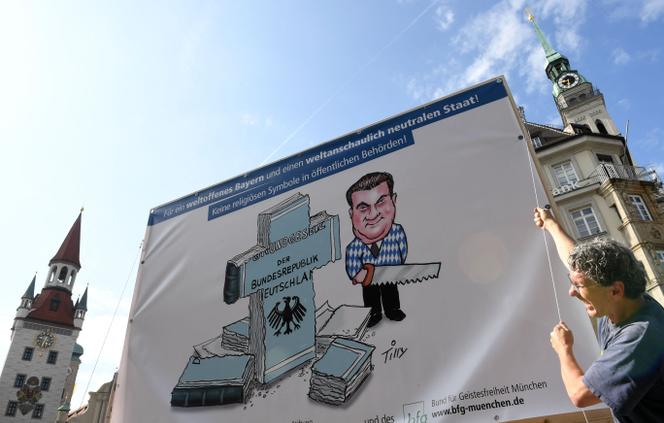

LETTER FROM BERLIN

It was one of his first initiatives as Bavarian minister-president. On April 24, 2018, six weeks after taking office, conservative Markus Söder pushed through a decree stipulating that "a [Christian] cross be hung prominently at the entrance to all public buildings to express Bavaria's historical and cultural identity."
Numerous protests followed. With six months left before regional elections that were expected to be challenging for his party, the Christian Social Union (CSU), Söder was accused by his opponents of encroaching on the territory of the far-right that had been climbing in the polls at the time. "He uses the cross for his own election campaign, and deliberately mixes politics and religion," said Federal Minister of Culture Claudia Roth, a Green party politician who has also served as a vice president of the Bundestag since 2013.
Church officials also voiced their dissent. "To consider the cross only as a cultural symbol is not to understand what it is. It's not up to the state to say what the cross means," said Cardinal Reinhard Marx, archbishop of Munich and president of the German Bishops' Conference, criticizing a decision that would generate "division" and "controversy."
The matter might have ended there, but that was before the French National Federation for Free Thought took up the issue. On October 5, 2018, it lodged an appeal with the administrative courts to challenge the decree, arguing that it called into question "the neutrality of the state in matters of belief and religion" and constituted "preferential treatment for the Christian religion at the expense of other religious and philosophical communities."
Five years later, the Swiss Federal Administrative Court made its decision. In a ruling handed down on December 19, 2023, it acknowledged that "the cross is, objectively, a symbol of the Christian faith." However, in its view, hanging one at the entrance to all public buildings does not represent an infringement of the freedom of belief guaranteed in Article 4 of the German Constitution.
The judges also pointed out that the 2018 decree specified that the crosses in question were intended to assert "the cultural and historical identity of Bavaria." For that reason, "hanging them in public buildings does not contradict the fundamental principle of the state's openness to other faiths."
As expected, Söder welcomed the Federal Administrative Court's decision. "The cross is a sign of our Christian and cultural identity. It's part of Bavaria," he was quick to post on social media network X, right after the ruling was published. The CSU group's president in Bavaria's regional parliament, Klaus Holetschek, also welcomed the ruling, saying: "As Bavaria is a state noted for its Christianity, it is right to use the cross to highlight this fact."
You have 50% of this article left to read. The rest is for subscribers only.
